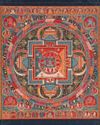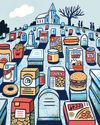
Before Jason Ballard became an en-trepreneur, he considered becoming a priest. His speech is still peppered with the idiom of faith—wicked, angels, sacred—and, when he latches on to a subject he cares about, he assumes a rousing, propulsive cadence. These days, the topic he is most evangelical about is our broken housing system. “What we’re doing is not working,” Ballard told me last spring. “There are far too many homeless people. Working-class people can’t afford basic housing in regular old American cities. Construction’s too wasteful. Houses aren’t energy-efficient enough. At the suburb scale, it’s dystopian, almost, what we’re getting, right? We’re supposed to be the most advanced version of humanity that’s ever existed and we can’t even meet this basic need properly. And that means the housing of our future can’t—not shouldn’t, but can’t—be like the housing we have now.”
In 2017, Ballard co-founded Icon, a construction startup focussed on what he believes to be a solution to the housing crisis: 3-D-printed construction, a largely automated method that creates buildings layer by layer, typically with cement-based material. The company has offices in the Yard, a mixed-use development in a formerly industrial area of Austin, Texas. The Yard is currently home to a sake company, a winery, a brewery, a canned-cocktail company, a hard-seltzer manufacturer, a whiskey distillery, and a Tesla dealership. On the morning I visited, the air was thick with the sweet-sour smell of fermentation.
Denne historien er fra January 23, 2023-utgaven av The New Yorker.
Start din 7-dagers gratis prøveperiode på Magzter GOLD for å få tilgang til tusenvis av utvalgte premiumhistorier og 9000+ magasiner og aviser.
Allerede abonnent ? Logg på
Denne historien er fra January 23, 2023-utgaven av The New Yorker.
Start din 7-dagers gratis prøveperiode på Magzter GOLD for å få tilgang til tusenvis av utvalgte premiumhistorier og 9000+ magasiner og aviser.
Allerede abonnent? Logg på

MEAN TIME
“Hard Truths.”

ENLIGHTEN ME
The secret beauty of mandalas.

THE BEST OF THEM
His was a genius for the ages. Will Gottfried Leibniz ever get his due?

DEATH CULT
Yukio Mishima’ tortured obsessions were his making—and his unmaking.

Prophecy
The night of Dev’s twenty-second birthday, he was invited to sit with the elders after dinner.

A TALE OF TWO DISTRICTS
Lauren Boebert and Colorado’s red-blue divide.

THE TIKTOK TRAIL
Andean migrants draw others to the U.S. with videos depicting themselves as living the American Dream.

LOVE AND THEFT
Did a best-selling romantasy novelist steal another writer's story?

OUR NEW TWO-FACTOR AUTHENTICATION SYSTEM
Our two-factor authentication system is expanding because text messages and e-mailed codes are becoming less secure. Also, we’re committed to making sure your log-in process is more of a hassle than it needs to be.

STILL PROCESSING
Why is the American diet so deadly?